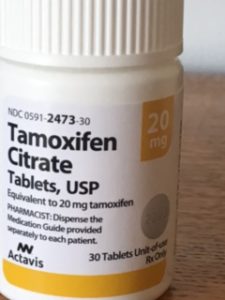It’s that time of year again. The annual chest x-ray and the six month lab work and “Let’s see how you’re doing appointment.” You know- the one where your surgical oncologist breezes into the room and somewhere in your heart you consider flinging yourself into her arms, but your mind convinces you to stay seated. The appointment goes well. My Queen Bee (i.e. the doc I owe my survival to) goes over my last round of bloodwork and writes me a neat and tidy prescription for my yearly chest x-ray. She asks how my hubby is doing and patiently waits as I go through my list of questions. Then she hands me a beautiful color brochure and mentions that at my next visit, there is an option she would like my hubby and I to consider. Don’t be confused by the beautiful color brochure- it’s not a vacation for two the Queen Bee is recommending. It is a test. A test of my tumor’s tissue. And now the question: “To Test or Not To Test?”
If you are a breast cancer thriver and you are nearing the five-year mark of survivorship, there is a new test available if you:
- Were diagnosed with early stage, invasive, estrogen-receptor positive breast cancer
- Are pre- or post-menopausal and are lymph node negative OR lymph node positive with 1 – 3 positive nodes
- Have OR will be completing 5 years of initial anti-hormone (endocrine) therapy (Tamoxifen, Femara, Arimidex,etc.)
Why another test you might ask? Studies on whether to continue hormone therapy for an additional 5 years or to stop after year 5 have yielded conflicting results. One of the latest studies suggests that an additional 5 years prevents a cancer recurrence in just 3% to 5% of patients. That’s not very many- unless of course you happen to fall in the 3% to 5% category. On the other hand, you also need to be aware that breast cancer is not a 5-year disease. Less that 1/2 of all recurrences will happen before year 5. More than 1/2 of recurrences will happen after year 5.
This new test is the Breast Cancer Index or BCI. It provides two important pieces of information when you and your doctor are making the decision about whether to extend or end anti-estrogen therapy after 5 years. First, BCI takes a look at the biology of your tumor and determines the probability of recurrence by assessing several genes that are associated with cell proliferation and the estrogen-signaling pathway. (In other words- how likely are the cells in my tumor to scream out: hey ESTROGEN- let’s divide and have a cancer party in here?!) The second piece of information examines the ratio of two genes associated with this estrogen-signaling pathway. I knew math would come in handy eventually!
The great thing (Is there really a great thing about this?) is that this test is completely non-invasive. Every breast cancer thriver LOVES the word, ‘non-invasive.’ Existing tissue from your tumor (oh yeah, they saved that sucker) is sent to the lab and in just 7 days- SHAZAM- your doctor receives your personalized report. Your individual percent risk of BC coming back after 5 years will be plotted on a risk curve. You will then be categorized as a high risk or a low risk of late recurrence based on patients in clinical trials with a similar risk score.
It all sounds so logical, so mathematical, so cut and dried. But in reality it’s not. As a thriver, it feels more like I’m at the local casino hedging my bets on recurrence vs. non-recurrence.

Photo courtesy of Adam Tinworth
Sometimes you win and take home the jackpot, and sometimes you lose and well… no one wants to lose this round. Here are a few questions to ask yourself as you hedge your bets:
- Do I really want to know my risk for breast cancer coming back after 5 years?
- Do I want to know if anti-estrogen therapies are likely to keep my cancer from recurring?
- Did I take my anti-estrogen med as it was prescribed for the last 5 years?
- How bothersome were my side effects?
- How willing am I to tolerate an additional 5 years of side effects?
- Do the possible benefits outweigh the possible complications of continuing therapy another 5 years?
So, I am tucking that lovely color brochure away in my desk drawer for hubby and I to read together. I am a research gal so here are the answers for me at this moment in time for Questions 1 – 6:
- Yes, I really do want to know. (I think.)
- Yes, I want to know if Tamoxifen will continue to be my friend.
- You bet- I took that pill every night and even made myself a little happy face chart.
- Side effects: They have been intense but tolerable.
- Very willing. I really want to hold my grandchildren and sit on a porch swing with my hubby.
- #6 remains to be seen.
To Test or Not To Test?
She is saying yes- oh yes- to the test.
***For more information go to http://bewiseraboutbreastcancer.org/
